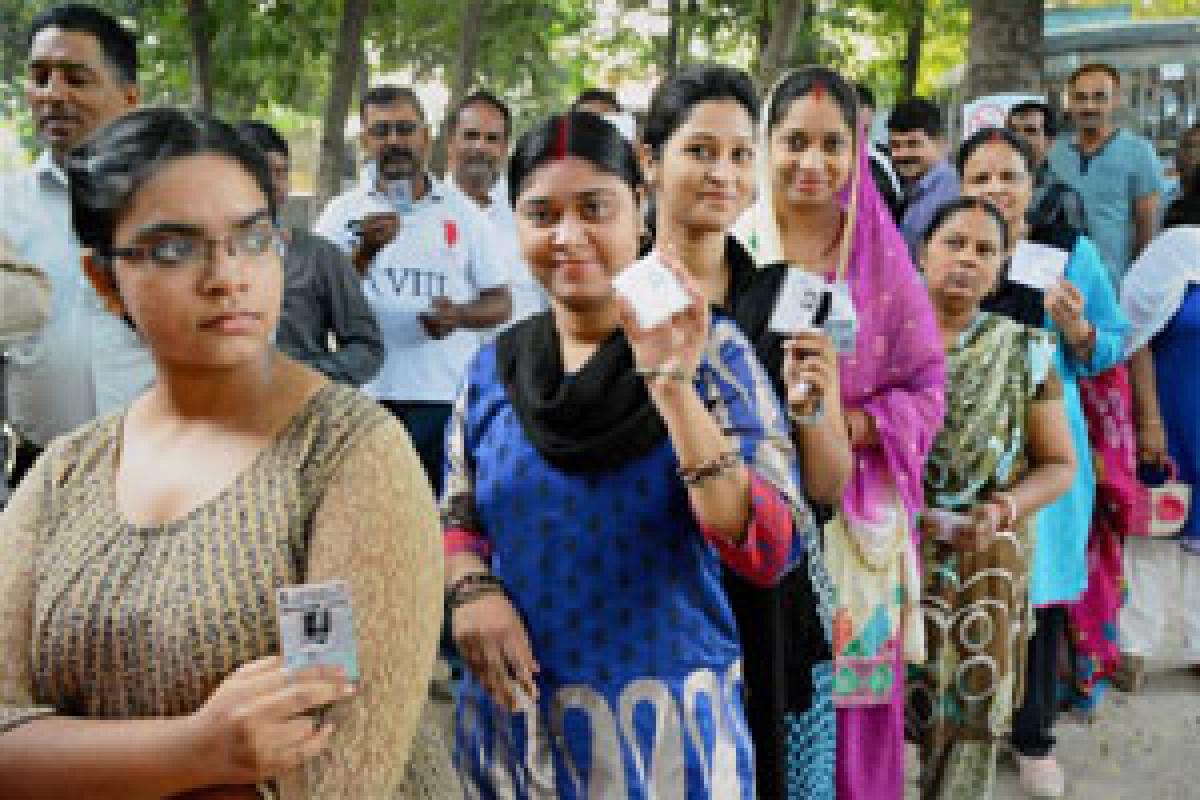Live
- ED conducts raids at two places in Bengal in chit fund case
- BJP Tamil Nadu President Expresses Confidence In Resolving Tungsten Mining Concerns In Madurai
- Karnataka Reviews Lake Safety Ahead of Monsoon: Minister Bhosaraju Tells Upper House
- Udupi MP’s queries, More key highways on high-priority
- Investing in Skills: Education Loans Paving the Way for Career Success
- Ghaggar river’s two stretches identified as polluted: Govt
- ICC chief Jay Shah meets Brisbane 2032 Olympics organising committee CEO
- Oxford Grammar High School Celebrates 44th Annual Sports Day with Grandeur
- Indian banking sector’s health remains robust, govt policy working very well: Top bankers
- iOS 18.2 Unveiled: New Features with ChatGPT Integration Revolutionize Your iPhone
Just In

Since women are supposed to be behind these official initiatives like prohibition in Bihar and banning Goans from entering casinos, men will not be overly pleased. A not inconsiderable portion of the votes which the proponents of the bans will get from women will be negated by the contrary votes of the men
Women are now being courted by some politicians who sense that their appeal to Dalits, backward castes (BCs) and Muslims is dwindling in the absence of providing more and more sops, or that their rivals are more successful in cultivating these vote banks.
In the Hindi belt, for instance, the support base of the Yadavs, the most dominant of the BCs, has become the monopoly of Laloo Prasad Yadav in Bihar and Mulayam Singh Yadav in UP. Interestingly, these bases are not transferrable across the boundaries of the two States. Evidently, the Bihari Yadavs are not enamoured of the leader of their caste group in UP and vice versa.
It is this watertight division which made Mulayam Singh break away from the Mahagathbandhan (grand alliance) in Bihar last year and ring the death-knell of the proposed Janata "parivar" comprising remnants of the old Janata Dal. This brittle and unreliable aspect of the social scene appears to have persuaded Nitish Kumar to court a new support base – that of women, which presumably cuts across caste lines though not the class barriers.
The Bihar CM’s compulsions are understandable. As a leader of the small caste group of Kurmis, who make up a mere 3.8 per cent of Bihar's population, he must have felt at a political disadvantage vis-a-vis his friend-turned-foe to uneasy friend again, Lalu Prasad, leader of the Yadavs who comprise 14 per cent of the state's population. To offset this drawback, Nitish Kumar has tried to rally the women to his side by implementing prohibition. The annual price which he is willing to pay for this policy is Rs 4,000 crore, which used to be the earnings of the excise department.
Apart from the revenue shortfall, which cannot but affect Bihar's development, there are other problems associated with prohibition, viz., criminalisation of the liquor trade via bootlegging, bribery of the police and excise officials and the conversion of law-abiding drinkers into dissemblers and liars about their habits.
Unlike Bihar, which is yet to shed its BIMARU or sick label because of a sluggish economy, the far more advanced state of Goa has also become a victim of the political tactic of wooing women as a vote bank. Instead of banning liquor to save the fair sex from abusive husbands/boyfriends, a section of the women in Goa is seeking to outlaw casinos to prevent the men folk from squandering the hard-earned money of their families. Chief Minister Laxmikant Parsekar is, therefore, considering legislation to ban Goans from entering the casinos, introducing a kind of apartheid in the state.
Earlier, identity politics was focussed on entire castes or communities. Now, the spotlight is on a gender-based group. It is no secret that differentiations of this kind tend to pit the chosen category against the others. Therefore, it is possible that a policy based on "guarding" women against ill-behaved men is not a recipe for harmonious family relations. Although the law against domestic violence has the same objective, it is meant to act as a warning. The policy on prohibition pre-empts the issue by assuming that all those who drink alcohol are louts.
Since this is patently not the case, the policy penalises not only those men who are not guilty but also those women who drink. Aimed at checking a few anti-socials, the ban on liquor tars everyone with the same brush. It may also be promoting class antagonisms, for the denizens of the cocktail circuit may believe themselves to be at the receiving end for the misdemeanours of a few among the lower-middle and working class.
Prohibition will be strongly resented by a much larger section of the population than what the Bihar government imagines. It will be the same in Goa if the locals are kept out of casinos on the plea of ensuring moral health and curing the spendthrift gambling addicts.
Since women are supposed to be behind these official initiatives, men will not be overly pleased. A not inconsiderable portion of the votes which the proponents of the bans will get from women will be negated by the contrary votes of the men.
Amulya Ganguli

© 2024 Hyderabad Media House Limited/The Hans India. All rights reserved. Powered by hocalwire.com







